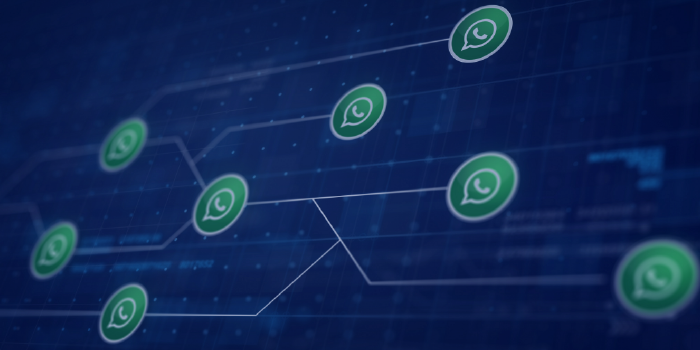Imagine this, your customer’s finger hovering over the buy button then… poof they vanish, leaving a cart full of potential behind.
Frustrating right?
Well, with a well-timed personalized WhatsApp message with an offer, you can close that sale in a jiffy. This is just one of the examples of WhatsApp marketing in action.
With over 2 billion users worldwide, WhatsApp is the 3rd most popular social networking site across the world. It also beats the other channels like email, SMS, and app notifications, in terms of engagement, with an average click-through rate (CTR) of 2.97%.
So, whether you are a small business or an enterprise, WhatsApp is a channel you should pay attention to.
This article will dive into why you need to use WhatsApp marketing, steps on how you can set it up, and the types of campaigns you can run.
What is WhatsApp Marketing?
WhatsApp marketing is a strategy to promote products and services using WhatsApp’s messaging platform. Businesses can leverage it to send targeted messages, updates, and promotional content to prospects and customers.
WhatsApp helps you improve customer engagement and communication in multiple ways. Here are a few examples:
- Bulk send templatized messages
- Run exclusive offers
- Share updates on orders
- Invite prospects to upcoming events
- Send reminders on abandoned carts
- Create a product catalog
- Share product re-stock alerts
- Run polls and surveys
According to a survey, 76% of WhatsApp users want to communicate with businesses through messaging. WhatsApp offers a way to personalize communication with prospects, and it opens up a real-time channel for them to clarify any doubts or questions related to your product.
In fact, WhatsApp is coming up with a feature that will let your prospects buy your product or service even without leaving the chat. So, now is the time to establish your presence with WhatsApp marketing and explore the various benefits it offers.
Benefits of WhatsApp Marketing
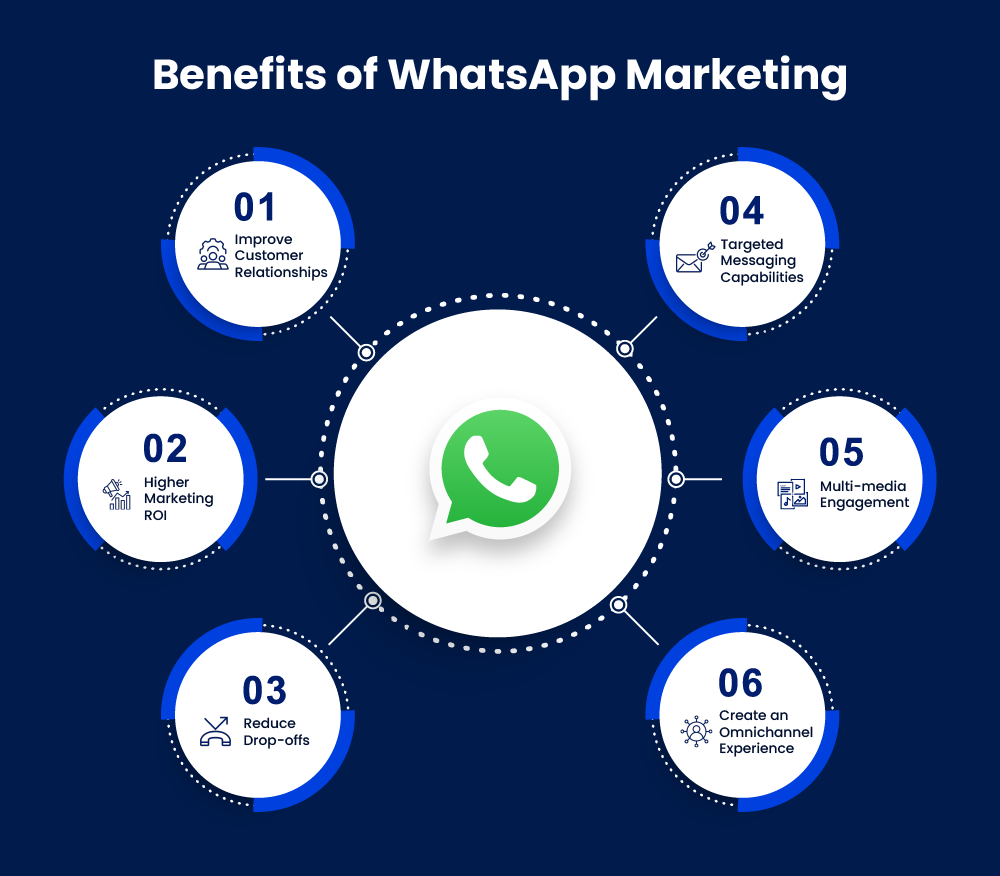
1. Improve customer relationships
WhatsApp is an instant communication channel. It allows businesses to engage with customers in real-time by addressing queries, offering personalized offers, etc. This creates a more interactive and responsive experience that ultimately fosters better customer connections.
2. Higher marketing ROI
WhatsApp outperforms other channels due to its higher open and click-through rates. Moreover, WhatsApp offers conversation-based pricing. That means you are not charged for each message you send, but rather 24 hours of conversation. If the customer reaches out to you first, you can have a conversation with them for 72 hours free of cost.
3. Reduce drop-offs
Through WhatsApp, you can automate trigger-based notifications and reminders. That way, when a prospect abandons a cart or leaves a form unfinished, you can reach out to them directly on WhatsApp. You can also send reminders for classes, appointments, etc., to reduce no-shows.
4. Targeted messaging capabilities
You can create segmented lists to run different campaigns for prospects based on stages of customer journey, demographics, user preferences and more. WhatsApp even has the capability to send bulk messages to unlimited unique contacts. This targeted, yet bulk-outreach, leads to higher customer engagement.
5. Multi-media engagement
One of the best things about WhatsApp is the range of content you can use to engage with people. You can share everything from images, gifs, audio, and documents to even videos to create a dynamic and interactive experience. Multimedia engagement helps businesses convey information and showcase their product in a richer and more engaging way.
6. Create an Omnichannel Experience
Omnichannel marketing and personalization are increasingly becoming a necessity. Omnichannel customers shop 1.7 more than single channel customers. You can create a cohesive customer experience for your customers by having different channels deliver consistent omnichannel communication.
Integrating WhatsApp with your CRM is a great way to do so. Linking WhatsApp to other channels such as email, and social media can help create a unified experience across various touchpoints.
WhatsApp is active in over 180 countries, with an average of 17 hours spent every month on it. Therefore, it’s one of the easiest ways to broaden your reach and connect with customers in a conversational way. Now, let’s look at how you can set up marketing campaigns on WhatsApp.
Step-by-Step Guide to Set Up WhatsApp Marketing Campaigns
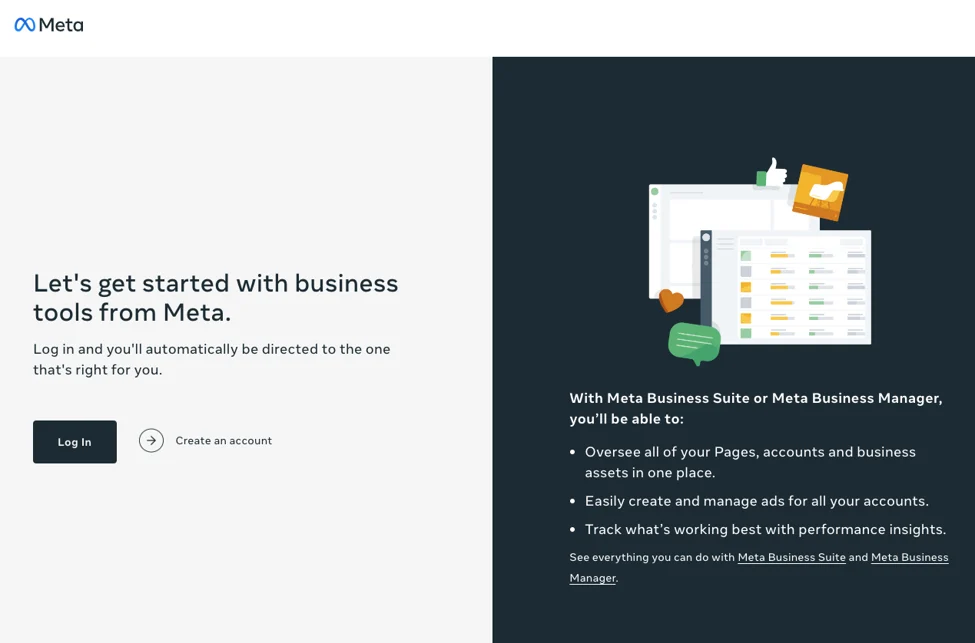
1. Create a WhatsApp business profile
- WhatsApp Business App: Perfect for small business owners, it can be easily downloaded from the App Store. It is free to use but limited in features. It does not offer business profile verification, broadcast messaging, or operations on more than four devices.
- WhatsApp Business Platform: This system is more suitable for medium to large enterprises, who have an extensive database. The WhatsApp Business Platform gives you flexibility with unlimited agents and the ability to auto-respond. You can customize various campaigns with chatbots and tailored workflows. It also allows you to integrate with various systems for consistent communication.
You can get started by logging into the Facebook Business Manager page to create a WhatsApp business account.
2. Integrate with communication platforms
Once your WhatsApp Business profile is created, you can integrate it with multiple communication platforms for a well-rounded customer experience.
The following are some of the software you can integrate with:
- Conversational AI platforms/ Chatbots like GupShup, Kaleyra, Infobip
- Customer Relationship Management (CRM) software like LeadSquared, Salesforce, Zoho
Integration with both these systems gives you the ability to automate messages, record and leverage past customer interactions, follow up on time, and so much more.
3. Take opt-in permission
One of the things WhatsApp is particular about is permission marketing. Your prospective customer must have explicitly opted in for communication with your brand. Moreover, your initial contact with the prospective customer can only be with a pre-approved WhatsApp template message.
You can only chat with the customer without a template when they respond or initiate the conversation first.
Here are a few ways to get opt-in permission:
- WhatsApp: When the customer reaches out to you first, ask them to opt-in to receive more updates.
- Website: Pop-ups on the website for WhatsApp updates and promotions.
- Landing Pages: If your prospective customer is downloading an ebook, provide them with an option to receive similar content on WhatsApp.
- WhatsApp Ads: You can also run WhatsApp ads on various social media platforms for customers to directly message you on WhatsApp.
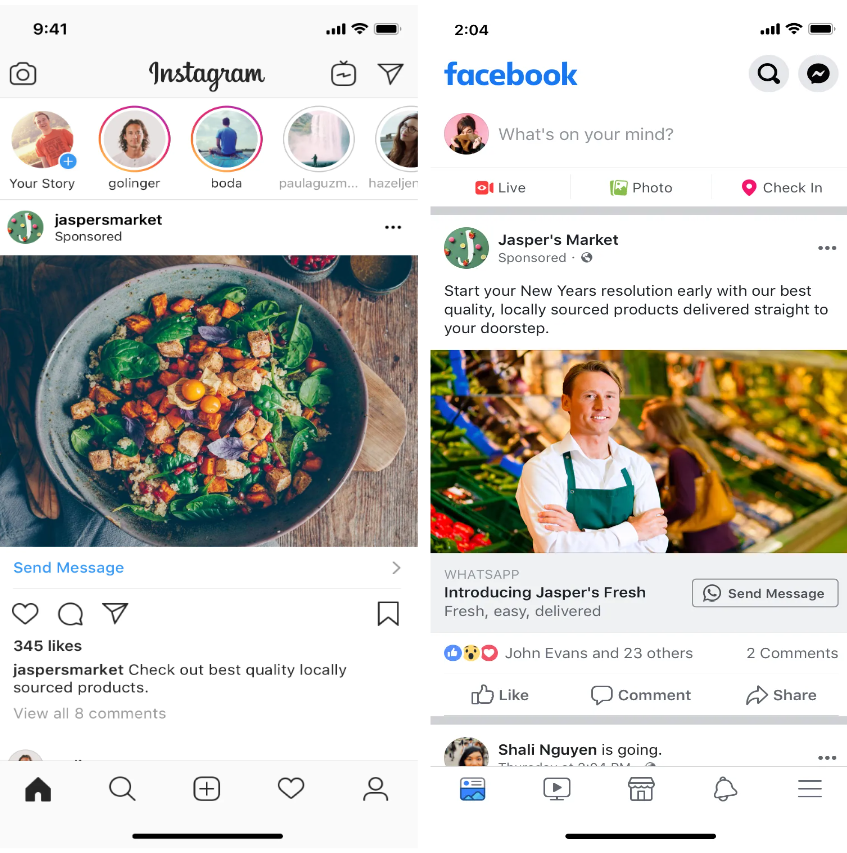
- At Check-out: If your customer is already purchasing something, you can ask their permission to share updates on their order and other new offers in the future.
Now that you have a roster of prospects and customers ready, let’s look at how to build your campaigns and get them approved.
4. Get your WhatsApp campaign templates approved
WhatsApp marketing allows you to personalize customer interactions using trigger-based automated templates. To improve conversions, businesses must make sure to add a call to action (CTA) button at the end of each message.
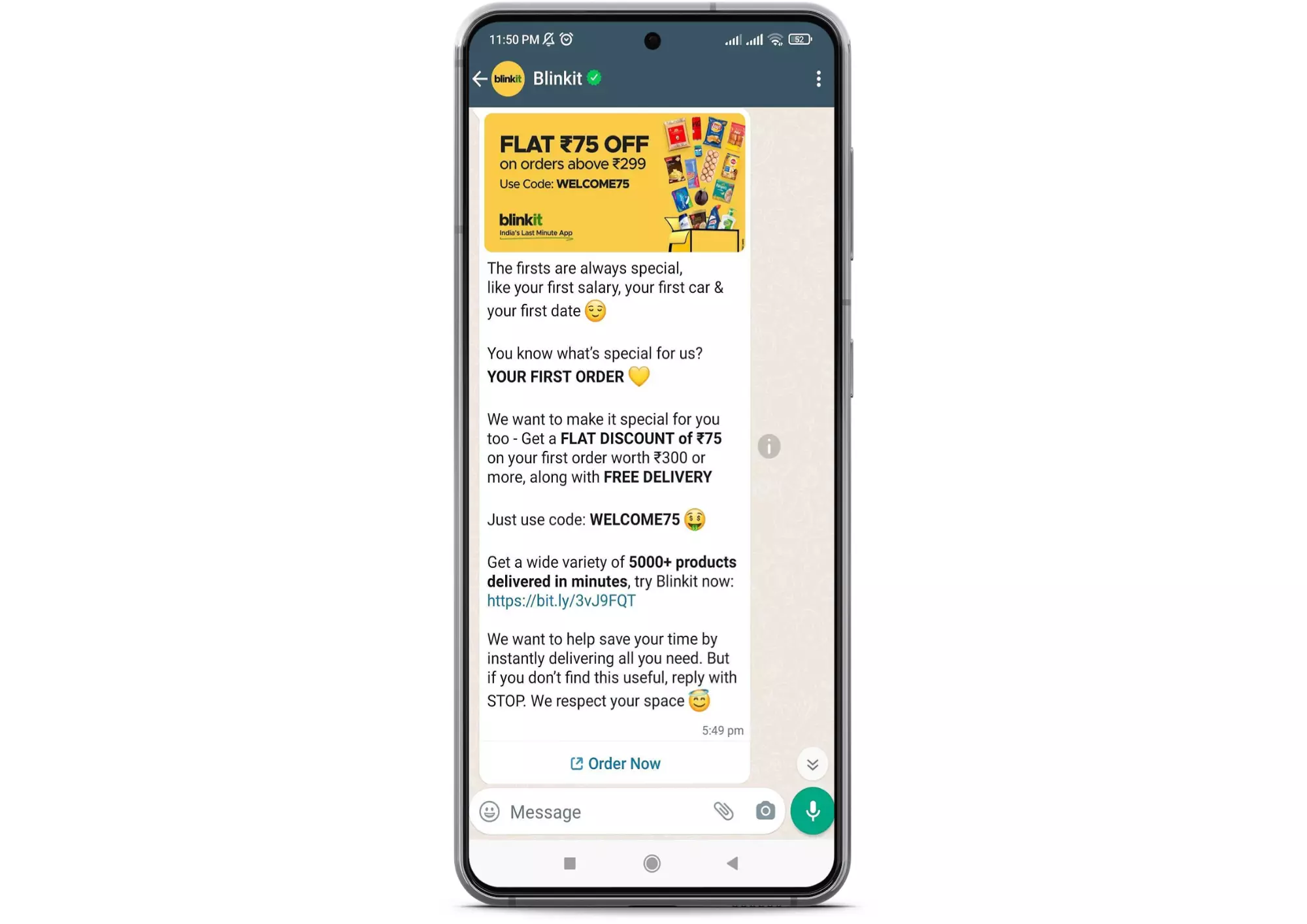
There are a few guidelines to keep in mind before creating any template:
- The template content is restricted to 1024 characters.
- The variable parameters need to be in curly brackets. For example, {{ 1 }}
- The name of the template can only contain lowercase words and underscores
To make it super easy for you, we have put together 30+ ready to use WhatsApp templates

You can send the templates to your service provider or add it yourself using your WhatsApp business account. The approval process typically takes 24-44 hours, after which you can send out the campaign if approved.
If you already have pre-approved templates, you do not need to go through the approval process multiple times.
5. Schedule personalized WhatsApp campaigns
Segment your customers into lists based on various criteria like demographics, needs, stage of customer journey, preferences, etc. This will help you send personalized and relevant messages.
You can set up sequences to target each of these lists using the pre-approved templates.
At the same time, you can set up automation to send out messages when the prospect completes certain activities. For example, sending confirmation for a spa appointment booked.
Now that you know how you can set up your WhatsApp marketing campaigns, it’s important to optimize it. You want to ensure that you are getting the most out of your efforts. Let’s understand exactly how you can do that.
6 Strategies to Improve the ROI of your WhatsApp Marketing Campaigns
1. Conduct A/B testing
A/B testing involves sending different versions of the same campaign with minor tweaks to two segments of your audience. This can help you determine which design or content leads to more clicks, sign-ups, etc. You can fine-tune and optimize your WhatsApp message templates and sequences by conducting this test on every other campaign.
2. Analyze WhatsApp campaign analytics
You can also use WhatsApp Campaign Analytics to improve campaign performance using data-driven decisions. You can analyze and compare campaign performance based on the following parameters:
- Open rate
- Click through rate
- Conversion rate
The following metrics can help you measure the effectiveness of WhatsApp as a channel:
- Total conversation: Total number of conversations you had with the prospect over 24 hours
- Free conversations: The number of times prospects-initiated conversations themselves.
- Increase in marketing database: The number of new leads added to your database.
3. Choose a strategic time and frequency for outreach
You don’t want to bombard your audience with a barrage of messages. In general, 2-3 campaigns are ideal, but you can decide how many times you want to engage with your audience based on your business.
You can also optimize open rates by scheduling the messages at the best times to engage with users. According to a report by Webengage, the following are the best times to engage:
- 12 pm to 8 pm (local time)- Middle East, North Africa, North America, Southeast Asia
- 8 am to 4 pm (local time)- India, Asia Pacific, LATAM
- 12 pm to 4 pm (local time)- European Union
4. Opt for a multi-media approach
WhatsApp is not a very formal platform. Leverage that to create a human touch with your customers. According to a report, 87% of marketers agreed that video marketing has helped them increase sales. So, use videos, audio, GIFs, and infographics to create a buzz. Polls and contests are also a great way to engage with customers.
5. Create contact for every stage of the sales funnel
Customize your content and outreach for each stage of the sales funnel. Engage prospects with marketing materials, events, or webinars. Create workflows on WhatsApp to share these collaterals based on the prospect’s activities. This way, you can automate outreach and keep the prospect interested.
Let’s say you are a beauty brand organizing a make-up masterclass for beginners. If the prospect signs up for it, share a curated list of products recommended for beginners. You can even share a guide to choose the right foundation shade, etc.
6. Integrate with a WhatsApp CRM
Connecting WhatsApp to a CRM can be a complete game-changer. A WhatsApp CRM, like LeadSquared, can help you do everything from lead nurturing and tracking lead activities to improving communication using one platform. Using features like Converse, you can respond to WhatsApp messages in real-time to solve their queries and close sales faster.
“We integrated WhatsApp with LeadSquared. When a social media lead comes into the system, we send out automated messages and understand their requirements better. This integration has also helped us nurture old leads and reactivate over 5000 conversations in the past year.”
IT Manager, IMS Proschool
Here are a few unique WhatsApp marketing campaign examples over the years to inspire you.
Top 3 WhatsApp Marketing Examples for 2024
1. Flipkart’s Big Billion Day campaign
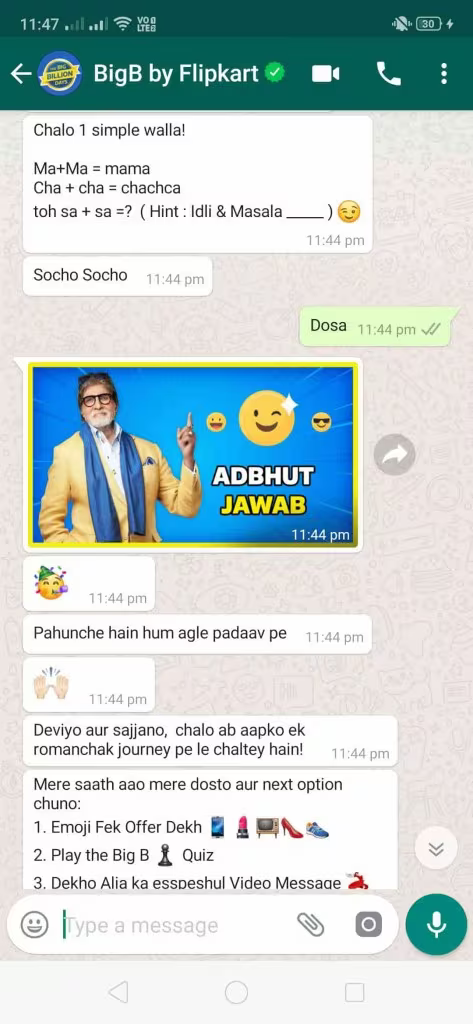
In 2019, Flipkart leveraged WhatsApp to promote its flagship sale, Big Billion Day. They used a chatbot to let users talk to the Bollywood superstar Amitabh Bachchan. Flipkart launched ad campaigns that re-directed them to WhatsApp and let them speak to the Big B bot.
The Big B bot quizzed the users, and if they got the answers right, it unlocked a deal or offer on various items on sale. They used audio, videos, and emoji-based games to engage the audience.
During the two-week campaign, Flipkart saw the following results:
- 3.5X more conversions (as compared to not using WhatsApp)
- 7X more high-quality visitors based on time spent on the platform
- $ 2.5 million in revenue
2. Hellmann’s WhatsCook campaign
WhatsCook was a live recipe campaign launched by Hellman’s Mayonnaise. They wanted to share ways that mayonnaise can be more than a condiment. Since WhatsApp has a massive user base in Brazil, it was the perfect platform for the campaign.
They encouraged users to sign up on their website to ask for recipes via chat on WhatsApp. They connected professional chefs with users and shared recipes based on the ingredients the users had. They used images, videos, and graphics to help with the recipe.
Using WhatsApp marketing, Hellmann achieved the following results:
- Reached 4 million + people in 10 days
- 1 in 2 website visitors signed up for the service
- 500+ dishes cooked and shared
- $150 thousand earned in revenue
3. Rajasthan Royals Merchandise campaign
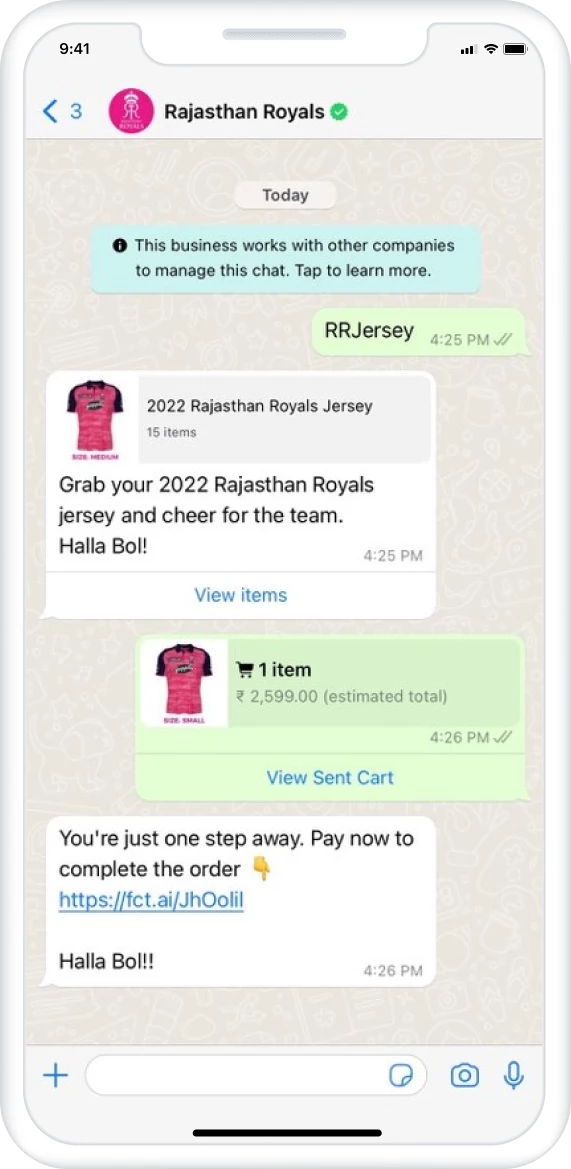
Rajasthan Royals, an Indian Premier League (IPL) cricket team, wanted to create an interactive and engaging experience for their fans. They promoted their WhatsApp number across various social media platforms.
The team shared updates about their players and merchandise and interacted with the fans using contests.
They added a catalog of fan merchandise on WhatsApp, where fans could directly place orders through WhatsApp using a payment link.
Throughout the campaign, the team saw the following results:
- 50% of merchandise orders through WhatsApp over one season
- 4x increase in sales through WhatsApp over 2.5 months
- 2x order-to-visit ratio over one season
- 60% of first-party data collected through WhatsApp in 5 months
Conclusion
In conclusion, WhatsApp marketing offers a powerful avenue to connect with your audience. With its vast user base, high engagement rates, and diverse communication capabilities, it stands out as a dynamic platform for businesses.
The real-world examples of successful WhatsApp marketing campaigns illustrate the platform’s potential in driving conversions, engaging users, and achieving substantial revenue. As businesses strive to stay competitive, integrating WhatsApp into your marketing mix becomes not just beneficial but essential in fostering meaningful connections and driving results.
To give a holistic customer experience to your prospects, combine it with WhatsApp CRM, which gives access to historical data on the prospects and alerts you of cross-selling opportunities. It also lets you act on your prospects instantly using one platform. To know more, you should get in touch with our team today!
1. Why should businesses utilize WhatsApp marketing?
The following are the reasons why business should use WhatsApp marketing:
1. Direct and personal connect
2. Quick communication
3. Targeted promotions
4. Reach a wider audience
5. Higher conversions
2. Is WhatsApp marketing better than traditional SMS marketing?
WhatsApp is miles ahead of SMS marketing and contributes to a more effective and modern communication. Mainly because of its rich multimedia content, higher engagement rates, two-way communication, advanced analytics and global reach.
3. What are some WhatsApp marketing tools?
The following are some top WhatsApp marketing tools:
1. Wati
2. Infobip
3. Kaleyra
4. Gallabox
5. Interakt





